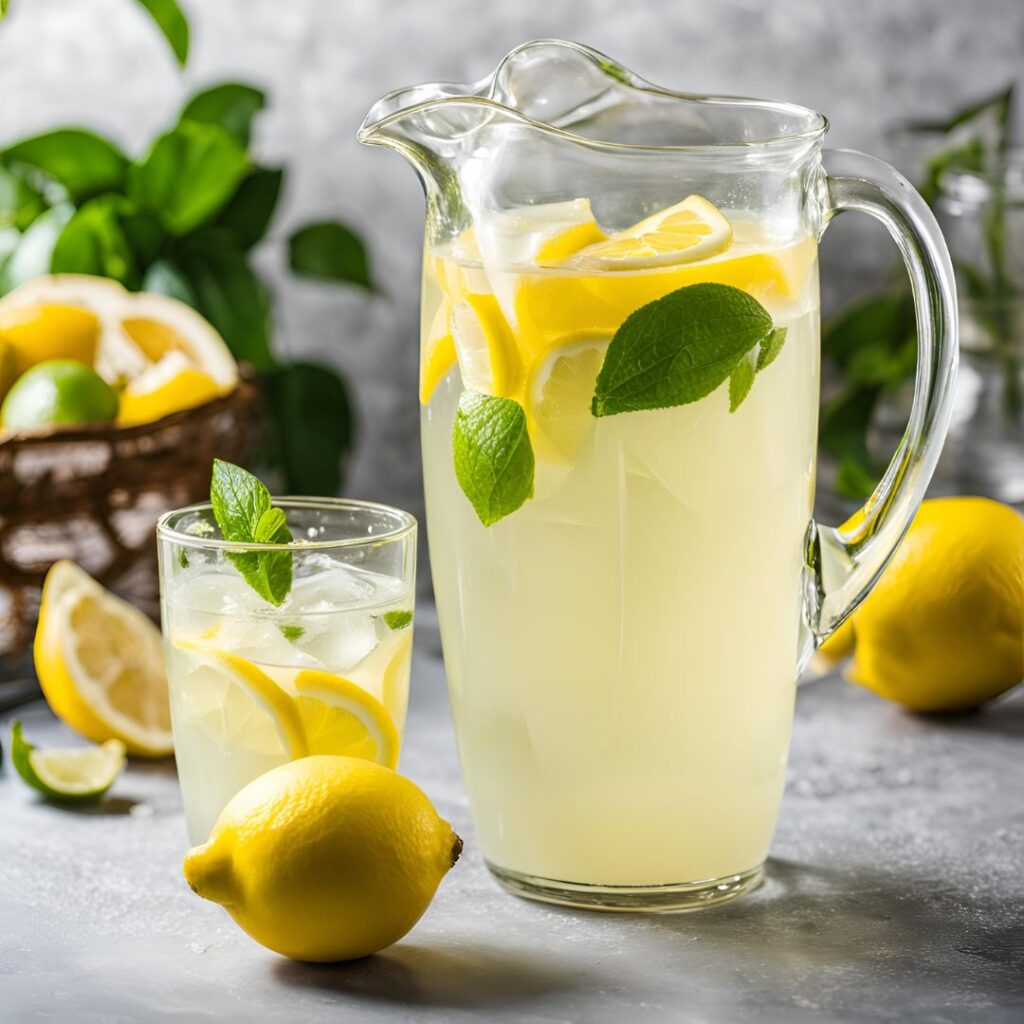

Classic Lemonade Recipe: The Timeless Refreshment. Few beverages can evoke feelings of nostalgia and summer like a glass of classic lemonade. This delightful drink, with its perfect balance of sweetness and tartness, has become synonymous with warm days spent outdoors, family gatherings, and sunny picnics. Whether served at a backyard barbecue, a summer party, or simply enjoyed on a quiet afternoon, lemonade is a refreshing staple that has been cherished for generations. In this article, we’ll explore the history of lemonade, the essential ingredients for making the perfect batch, its cultural significance, and the simple recipe that anyone can master.
The origins of lemonade can be traced back centuries, with various forms of the drink appearing in different cultures. The earliest known mention of a lemon-based drink dates back to Middle Ages in the Arabian Peninsula, where a concoction of lemon juice, sugar, and water was enjoyed. This beverage, known as "qatarmizat," paved the way for the lemonade we know today.
The popularity of lemonade spread to Europe during the 18th century, especially in France, where it became a fashionable drink among the upper classes. Street vendors in Paris began selling lemonade to the public, and it quickly gained popularity as a refreshing beverage. By the 19th century, lemonade stands began popping up in America, especially during hot summer months. The drink became a symbol of childhood and summer in American culture, with children setting up their own stands to sell lemonade for a few cents a cup.
Lemonade holds a special place in the hearts of many for several reasons. First and foremost, it is a simple and accessible drink that requires just a few ingredients: fresh lemons, sugar, and water. This simplicity makes it easy for anyone to prepare, whether they are seasoned cooks or complete novices in the kitchen.
Moreover, the bright and tangy flavor of lemonade is invigorating and refreshing, making it a perfect thirst-quencher on a hot day. The balance of sweetness from the sugar and tartness from the lemons creates a harmonious blend that tantalizes the taste buds. It’s this delightful combination that makes lemonade a perennial favorite, not just in the summer, but year-round.
Lemonade also evokes feelings of nostalgia and fond memories. For many, the taste of freshly squeezed lemonade reminds them of childhood summers spent playing outside, family gatherings, and vacations at the beach. It is a drink that brings people together, often served at celebrations, barbecues, and picnics.
Creating the perfect classic lemonade is straightforward, but the quality of the ingredients you use can greatly impact the final product. Here’s a closer look at what you’ll need:
Fresh Lemons: The star ingredient, fresh lemons, are essential for achieving the right balance of acidity and flavor. While bottled lemon juice may be convenient, it often lacks the bright, zesty flavor that fresh lemons provide. To yield about one cup of juice, you’ll typically need 4 to 6 lemons, depending on their size and juiciness.
Granulated Sugar: Sugar is crucial for balancing the tartness of the lemons. The amount can be adjusted according to your taste preferences; some may prefer a sweeter lemonade, while others enjoy a more tart flavor. For a classic recipe, one cup of sugar is typically used.
Cold Water: Water is necessary to dilute the lemon juice and sugar mixture, creating a refreshing beverage. The ratio of lemon juice to water can be adjusted to achieve your desired level of tartness.
Ice: Serving lemonade over ice not only keeps it chilled but also enhances the drinking experience. A frosty glass of lemonade is particularly refreshing on a hot day.
Garnishes (Optional): While not required, garnishes can elevate the presentation of your lemonade. Fresh lemon slices, mint leaves, or even berries can add a touch of color and flavor, making the drink even more appealing.
Lemonade is more than just a beverage; it represents a sense of community and connection. In many cultures, lemonade is served at gatherings and celebrations, symbolizing hospitality and warmth. The act of making and sharing lemonade often brings people together, whether it's at a family barbecue, a neighborhood block party, or a casual get-together with friends.
Additionally, lemonade stands have become an iconic representation of childhood entrepreneurship. Many children set up stands during the summer to sell lemonade, teaching them valuable lessons about business, money management, and customer service. These stands are often tied to personal stories and memories, making them an endearing part of growing up.
--
Classic lemonade is a timeless beverage that embodies the essence of summer and the joy of simple pleasures. Its rich history, refreshing flavor, and cultural significance make it a beloved drink enjoyed by people of all ages. Whether you’re reminiscing about childhood summers, hosting a gathering, or simply looking for a refreshing drink on a hot day, classic lemonade is the perfect choice.
With just a few simple ingredients and minimal preparation time, anyone can master the art of making lemonade. So gather your fresh lemons, sugar, and water, and prepare to delight your taste buds with this iconic drink. Raise a glass of homemade lemonade and celebrate the warmth of summer, the joy of togetherness, and the nostalgia of cherished memories. Cheers to the refreshing delight of classic lemonade!
Juice the Lemons:
Make the Simple Syrup:
Combine Ingredients:
Serve:
Enjoy:
4 servings
Always opt for fresh lemons instead of bottled lemon juice. Freshly squeezed lemon juice provides a vibrant flavor that is essential for a refreshing lemonade. Look for lemons that feel heavy for their size and have a bright, smooth skin, as these are usually juicier.
The sweetness of your lemonade can be adjusted based on your personal preference. Start with the standard one cup of sugar, but taste the mixture as you go. You can always add more sugar or dilute it with additional water if it’s too tart. If you prefer a healthier option, consider using honey or agave syrup as a natural sweetener.
For a perfectly smooth lemonade without grainy sugar at the bottom, prepare a simple syrup. Combine equal parts sugar and water in a saucepan, heat until the sugar dissolves, and then cool it before mixing it into your lemonade. This ensures that the sugar blends evenly, resulting in a well-balanced drink.
To enhance the refreshing quality of your lemonade, serve it over ice. For an extra touch, consider freezing some lemon slices in ice cubes and adding them to your glasses. This not only keeps the drink cold but also adds an appealing visual element.
While classic lemonade is delicious on its own, don’t hesitate to get creative! Try infusing your lemonade with fresh herbs like mint or basil, or adding berries such as strawberries or raspberries for a fruity twist. You can also experiment with sparkling water instead of regular water for a bubbly version of lemonade.
Classic lemonade is a refreshing beverage made from fresh lemon juice, sugar, and water. It has a perfect balance of sweet and tart flavors, making it a popular choice for warm weather and gatherings.
You will typically need about 4 to 6 medium-sized lemons to yield one cup of fresh lemon juice. The exact amount can vary depending on the juiciness of the lemons.
While bottled lemon juice can be used in a pinch, it often lacks the vibrant flavor and freshness of freshly squeezed lemon juice. For the best taste, always use fresh lemons.
To adjust the sweetness, simply add more sugar or simple syrup to the mixture. For a tart lemonade, add more fresh lemon juice or reduce the amount of sugar. Taste as you go to find your ideal balance.
Simple syrup is a mixture of equal parts sugar and water, heated until the sugar dissolves. It ensures that the sugar blends smoothly into your lemonade, preventing graininess at the bottom of the pitcher.
Lemonade with this recipe can be stored in the refrigerator for about 5 to 7 days. For the best flavor, consume it within the first few days. Always keep it sealed in an airtight container.
Yes! You can use alternatives like honey, agave syrup, or stevia for a sugar-free version of this Lemonade Recipe. Adjust the quantity to suit your taste, as these sweeteners may have different sweetness levels compared to sugar.
You can experiment with various flavors by adding fresh herbs (like mint or basil), fruits (such as strawberries, raspberries, or watermelon), or even spices (like ginger) to your lemonade. This adds unique twists to the classic recipe.
To make lemonade for a crowd, simply multiply the ingredients based on the number of servings you need. Mix the ingredients in a large pitcher or beverage dispenser, and serve over ice. Consider adding fruit slices or herbs for garnish.
Yes! You can freeze lemonade made with this recipe in ice cube trays or freezer-safe containers. This allows you to enjoy chilled lemonade on hot days or use the frozen cubes to make refreshing drinks without diluting the flavor.
Classic lemonade is a timeless beverage that embodies the essence of summer and the joy of simple pleasures. Its rich history, refreshing flavor, and cultural significance make it a beloved drink enjoyed by people of all ages. Whether you’re reminiscing about childhood summers, hosting a gathering, or simply looking for a refreshing drink on a hot day, classic lemonade is the perfect choice.
Enjoy the yum :)